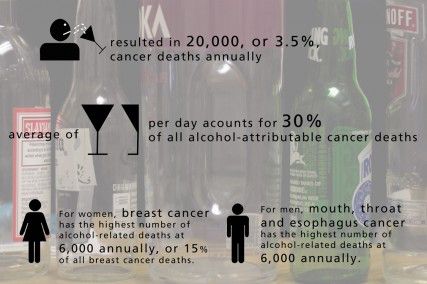
Consumption of alcohol, even small amounts by non-binge drinkers, might be linked to higher rates of death from cancer, according to a new study by Boston University researchers.
BU School of Medicine professor Timothy Naimi examined recent U.S. data on alcohol consumption and cancer mortality and found a correlation between the two, according to a Friday BUSM press release.
“What is hard is that people haven’t realized that alcohol is such a preventable factor to cancer deaths,” Naimi said.
Alcohol consumption is connected to about 20,000 yearly cancer deaths, and accounts for 3.5 percent of all cancer-related deaths in the U.S., according to the study.
Although the risk of cancer becomes higher as alcohol consumption increases, researchers discovered 30 percent of all alcohol-attributed cancer deaths are associated with consuming one-and-a-half drinks or fewer per day.
Tibor Palfai, a BU professor of psychology, said college students in particular ignore health warnings because they believe the associated risks will not affect them.
“Part of the reason that health warnings often have little influence on drinking behavior is that they are about distal probabilistic outcomes,” Palfai said. “In other words, they [the risks] are things that may have a low probability of occurring.”
He said Naimi’s study and other similar studies might counteract heavy-drinking stereotypes college students believe they must fulfill.
“Although it is unlikely that a single research study will lead to broad reductions in drinking, it is still a piece of a broader approach to help students become aware of how heavy drinking may put them at risk for harm,” Palfai said.
Breast cancer is currently the most common type of cancer related to alcohol consumption, according to the study.
The study also found alcohol-related cancers of the mouth, throat and esophagus are responsible for a total of 6,000 deaths each year in men.
However, despite the study’s findings, a number of BU students said they do not believe their peers will heed the warnings against drinking’s harmful effects.
Lindsey Garber, a College of Communication senior, said she thinks students will continue to drink heavily despite these warnings.
“[Students] probably don’t think about possible future diseases at younger ages,” she said. “Right now at this stage in our lives, it’s more about having fun with our friends.”
Alex Bras, a School of Hospitality Administration freshman, said, unlike tobacco, drinking is socially acceptable and, as such, will not be cause for concern amongst college students.
“If it wasn’t as socially acceptable to drink, people would be more cautious of these warnings,” he said. “Just as smoking has become less socially acceptable, people have become more cautious of those warnings.”
Naimi said the correlation between alcohol consumption and cancer is important for people to understand.
“If people are drinking heavily in college, they are unlikely to be influenced by this article,” Naimi said. “But this research is important for the general population to know the link of cancer.”






















































































































